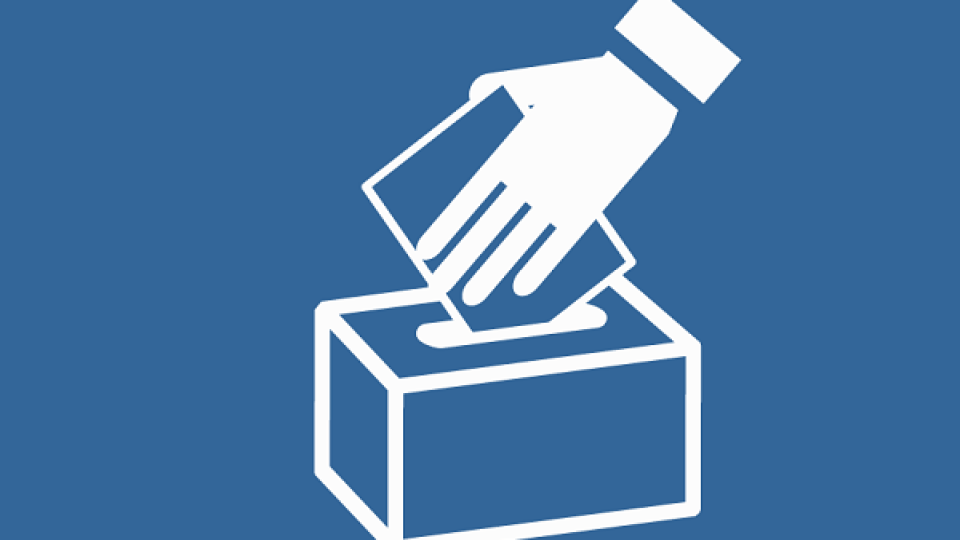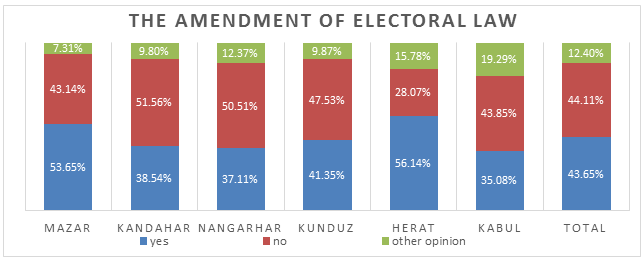The NUG and electoral reforms
Since the formation of the National Unity Government (NUG), the electoral reform has become an enigma in the country. The Afghan President and Chief Executive Officer had made serious commitment in the NUG agreement to reform electoral system. But due to the complicated process of electoral reform, it seems that it has become a political issue.
Wolesi Jirga has successively rejected the Afghan President’s legislative decrees on electoral reforms. Recent legislative decree of the President was also rejected by the absolute majority of Wolesi Jirga members. The Presidential Palace termed it a step back in bringing reforms in the electoral system.
The question is, why has electoral reforms have been challenging? What are the demands of the government and Wolesi Jirga? And finally what will be the fate of the upcoming election?
The need for electoral reforms
After the controversial parliamentarian election in 1389, although the controversies raised from fraud in the election were calmed down, but due to the problems in the electoral system, the new electoral law was approved by the parliament in 1392 and was signed by the Afghan President Hamid Karzai. The 1393 Afghan Presidential Election was also held with vast fraud and conflict over the outcomes of the elections lasted for several months. Later with the mediation of the US Secretary of States John Kerry the two rivals signed the NUG agreement, one of the most important provisions of which was about electoral reforms.
After the formation of the NUG, no serious efforts were made to reform electoral system and after many delays Special Electoral Reform Commission (SERC) was formed. The commission offered some recommendation in order to reform electoral system and based on these recommendations, the Afghan President issued two decrees which were rejected by Wolesi Jirga one after another.
The main driver behind the government’s efforts for electoral reforms in its first year was preparation to hold the Wolesi Jirga and district council elections so that it could amend the constitution and legalize the post of Executive Office. But at the height of the arguments about the expiration of the two year period of the NUG, the US Secretary of States John Kerry visited Kabul and with an interpretation of the NUG agreement said that the NUG’s term is for five year and thus the question of the government’s legitimacy was resolved.
Legislative decrees of the President
Two legislative decrees of the President (the decree-84 and 85) [1] which was about amending the electoral law and the law on the structures of the election commissions had brought the following main changes in the electoral system based on the recommendations of SERC:
- Establishment of lists of voters based on voter’s ID documents;
- Changes in the composition of the Selection Committee;
- Changes in the composition and tenure of the Independent Election Commission (IEC) by decreasing the number of commissioners and staggering their terms of service;
- Change in the requirements for the Independent Electoral Complaints Commission’s commissioners;
- Change in the composition of the Wolesi Jirga (appropriation of an extra seat for Sikhs and Hindus);
- Change in the composition of the provincial and district councils (fixing 25% of seats for women);
- Employing school teachers and other civil servants as temporary electoral staff.
On December 21, 2015, the Afghan Parliament rejected the first decree of the Afghan President which was about amending the law on the structure of electoral bodies and on December 26, it rejected his another decree which recommended the amendment of electoral law.
On March 5, 2016, the Afghan government announced that the President has issued two other legislative decrees (decree-158 and 159) [2]. These two decrees were almost the same as the previous decrees and it had only brought some changes in the selection process of the members of the election commissions.
On April 23, 2016, the Presidential Palace sent the decree amending the law on the structure of the electoral bodies to the Parliament. Besides other changes, the decree had also proposed some changes in the composition of the Selection Committee; but Wolesi Jirga rejected the decree. The Presidential Palace did not send the decree recommending the amendment of the electoral law to the parliament.
Recent decree of the President about amending the law on the structure of electoral bodies was very controversial and recommended some changes in the composition of the Selection Committee. Inclusion of the heads of Wolesi Jirga, Mishranu Jirga and the Supreme Court in the Selection Committee; establishment of the voter lists according to voters’ ID documents; change in the composition of the Wolesi Jirga, provincial council and district council; and employing schools teachers and other civil servants as temporary electoral staff were the changes that some of them were also recommended in the previous decree sent to the parliament. This decree was also rejected with an absolute majority by Wolesi Jirga on June 13, 2016.
Non-inclusion of the Parliament in the composition of the Selection Committee is considered the reason behind the rejection of the President’s first decree; therefore, in the next decree of the President the head of the two houses of the Parliament were included in the composition of the Selection Committee. But this decree was also rejected and this time the delay in sending the decree to Wolesi Jirga was said to be the reason behind its rejection. (The decree was supposed to be sent to the parliament one month after the beginning of the New Year but the government sent it after two months.)
On the other hand, the Independent Electoral Complaints Commission (IECC) welcomed the rejection of the decree and called on Mishranu Jirga to reject the decree too. The spokesman of IECC Nader Mohseni said that the government’s efforts to reform electoral system is illegitimate and said that political purposes are hidden behind it. He also added that instead of reforming electoral system the decree has emphasized on changing the commissioners and increasing the role of foreigners in election affairs.
There is also some analysis that electoral reform is mostly focused on 50-50 division of the commissions and commissioners and in this case the electoral bodies would lose their independence and independent candidates would not make their way to the parliament. Therefore, instead of changing the individuals the government must focus on bringing real reforms in the electoral system.
People’s view about electoral reforms (survey)
A survey by the Center for Strategic and Regional Studies show that the majority of the people are not optimist about the transparency of the upcoming Parliamentary election. Based on the survey 71.89% of the people believe that the upcoming parliamentary election would not be transparent and independent and only 10.2% says that the upcoming parliamentarian election will be transparent and independent. In this regard most of the pessimism is recorded in Nangarhar and Balkh provinces. (For further info see Chart-1)
Chart-1: will the upcoming Parliamentarian election be transparent and independent?
According to the survey, the participants of the survey had various opinions about the institutions that would hold the election. Most of the interviewees (46.9%) say that the election would be held by a New Independent Election Commission; 34.11% believe that the election would be conducted by the current commission after bringing reforms in it; and only 10.06% have said that the current commission would hold the election. (For more information see Chart-2)
Chart-2: who would conduct the upcoming Parliamentarian election?
People have various opinions about the government’s efforts to amend the electoral law in the past two years. 44.11% say that these efforts are not correct while 43.65% others believe that these efforts are correct. (See Chart-3)
Chart-3: do you think that the government is on the right track to reform the electoral system?
Conclusion
The process of electoral reforms which was a precondition to hold the elections was very slow, and given the delay in bringing electoral reforms, most of the people are not optimistic about the holding upcoming parliamentarian elections. But the Presidential Palace emphasizes on holding the election on its specific date.
According to a source in Presidential Palace, despite all the problems, the upcoming parliamentarian elections would be held on the mentioned date.
After rejection of the recent decree of the President on reforming the electoral system, the Presidential Office announced that it will pursue the electoral reform process after consulting the legal institutions. The Presidential Office resists that the government is committed to hold the elections on its mentioned date and therefore has appointed the financial and security committees and in this regard it will announce its decision after consulting with legal institutions. This time the government will probably send the decree to reform electoral system to the Supreme Court.
The end
[1] The amended text of electoral law: http://moj.gov.af/content/files/OfficialGazette/01101/OG_01184.pdf
[2] The text of the electoral law after the second amendment: http://moj.gov.af/content/files/OfficialGazette/01201/OG_01207.pdf




